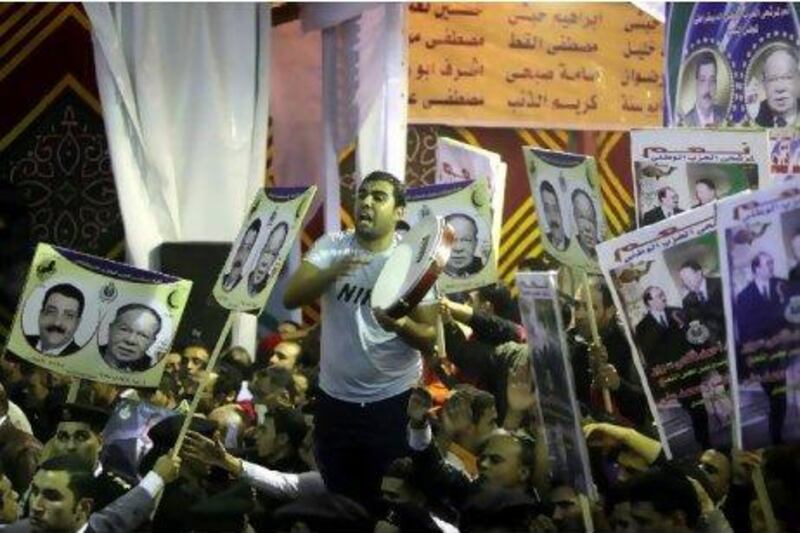A government crackdown on Egypt's principal Islamist opposition group is providing more fodder for government critics urging a boycott of Sunday's parliamentary vote.
Violence and perceived fraud during the vote for the People's Assembly, the lower and more powerful house of parliament, will ultimately determine whether a boycott proves to be a politically wise strategy, candidates and political analysts say.
The split between those who favour a boycott and those who oppose one is a recurring conundrum faced by opposition political parties that believe the electoral system is rigged: boycott and have no say in political life, or participate and risk legitimising the ruling party.
In the past two weeks, the government has arrested hundreds of supporters of the Muslim Brotherhood, the banned Islamist opposition group. Further, independent observers have accused candidates for the ruling National Democratic Party (NDP) of rampant electoral infractions.
On Wednesday, Human Rights Watch criticised the government for "mass arbitrary arrests, wholesale restrictions on public campaigning, and widespread intimidation of opposition candidates" that will make "free and fair elections unlikely".
The arrests and alleged fraud led Yousef al Qaradawi, the head of the International Union of Muslim Scholars and a spiritual leader of the Muslim Brotherhood, to call for a boycott.
"It is obvious that the opposition will receive only scraps from the Egyptian regime," he told DPA, the German news agency this week.
The events also support the decision by Mohammed ElBaradei, the leader of a national pro-democracy movement, to boycott the vote, said Abdulrahman al Youssef, the general co-ordinator of Mr ElBaradei's campaign for change. The campaign has received widespread international media attention but is still unknown to many Egyptians, in part because it is not participating in the poll.
"Participation in these elections gives them validity and legality, and gives them a legal appearance in front of world opinion," Mr al Youssef said.
The political strength of the boycott strategy will ultimately be determined by how election day itself is perceived by the public, said Bruce Rutherford, an Egypt expert and assistant professor of political science at Colgate University in the US.
"If the elections prove to be highly rigged and particularly if they prove to be violent, then that tends to confirm ElBaradei's assessment that the regime is fundamentally failing the Egyptian people, and the resonance of his message will likely increase," Mr Rutherford said.
The Muslim Brotherhood gains from spreading its message and leveraging the legal immunity offered by parliament membership to organise itself, he said, "but the [political] utility of that declines when the government increases repression".
Mr al Youssef said he expects that the election will be more violent and fraudulent than Mr ElBaradei predicted.
Egypt's government, led by President Hosni Mubarak, has pledged to host a free and fair election under the supervision of the High Elections Commission and a limited number of non-governmental organisations.
The comments by Mr Qaradawi followed last month's petition by 20 current and former Muslim Brotherhood members that urged a boycott.
Nonetheless, the movement's leaders remain committed to running in the election, said Sobhi al Salah, a Muslim Brotherhood leader and member of parliament. The Brotherhood is fielding candidates in one-third of the 508 parliamentary electoral districts.
Staying on the sidelines would allow the government to claim a popular mandate that it does not deserve, Mr al Salah said.
"Our participation resulted in giving this image of the political life in Egypt and if we didn't participate, the system would have gone on in this tricky, deceptive manner," he said. "Refraining from participating means we surrender to the status quo."
Calls for a boycott reflect the opposition's split strategy, but will ultimately have little effect on an election in which turnout is already expected to be extremely low, said Amr al Shobaky, a political analyst at the semi-official Ahram Centre for Political and Strategic Studies.
Less than 30 per cent of Egyptians turned out for the 2005 parliamentary vote, and voter turnout in June's elections for the Shura Council, the upper house of parliament, were less than 10 per cent, according to a number of estimates.
"The majority of Egyptians boycott not for a political reason but because they don't believe - not because ElBaradei or someone else asked them to," Mr al Shobaky said.





